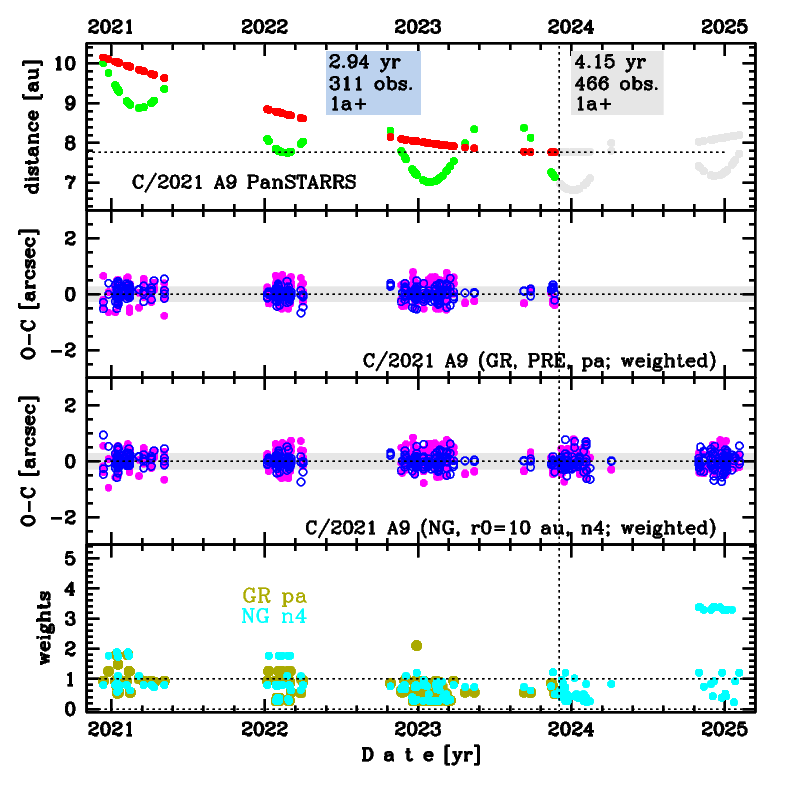C/2021 A9 PanSTARRS
more info
Comet C/2021 A9 was discovered on 12 January 2021 with the Pan-STARRS 1 telescope (Haleakala), that is almost two years before its perihelion passage. a few pre-discovery measurements were next found extending the data arc one month back. Comet is still observed as in April 2025.
Comet had its closest approach to the Earth on 3 January 2024 (6.80 au), about one month after its perihelion passage.
Preferred NG solution given here is based on data span over 4.15 yr in a range of heliocentric distances: 10.15 au – 7.76 au (perihelion) – 8.20 au; also GR orbits based on the same data arc as NG orbit and pre-perihelion orbital leg are given.
This Oort spike comet suffers tiny planetary perturbations during its passage through the planetary system; and its future orbit have semimajor axis notable longer than 10,000 au.
Comet had its closest approach to the Earth on 3 January 2024 (6.80 au), about one month after its perihelion passage.
Preferred NG solution given here is based on data span over 4.15 yr in a range of heliocentric distances: 10.15 au – 7.76 au (perihelion) – 8.20 au; also GR orbits based on the same data arc as NG orbit and pre-perihelion orbital leg are given.
This Oort spike comet suffers tiny planetary perturbations during its passage through the planetary system; and its future orbit have semimajor axis notable longer than 10,000 au.
| solution description | ||
|---|---|---|
| number of observations | 311 | |
| data interval | 2020 12 12 – 2023 11 21 | |
| data arc selection | data generally limited to pre-perihelion (PRE) | |
| range of heliocentric distances | 10.15 au – 7.76au | |
| detectability of NG effects in the comet's motion | comet with determinable NG~orbit | |
| type of model of motion | GR - gravitational orbit | |
| data weighting | YES | |
| number of residuals | 607 | |
| RMS [arcseconds] | 0.27 | |
| orbit quality class | 1a+ | |
| orbital elements (heliocentric ecliptic J2000) | ||
|---|---|---|
| Epoch | 2023 12 02 | |
| perihelion date | 2023 12 01.92431672 | ± 0.00236451 |
| perihelion distance [au] | 7.75999985 | ± 0.00001348 |
| eccentricity | 1.00129449 | ± 0.00000602 |
| argument of perihelion [°] | 211.474010 | ± 0.000170 |
| ascending node [°] | 314.835539 | ± 0.000014 |
| inclination [°] | 158.01401 | ± 0.000012 |
| reciprocal semi-major axis [10-6 au-1] | -166.82 | ± 0.77 |
